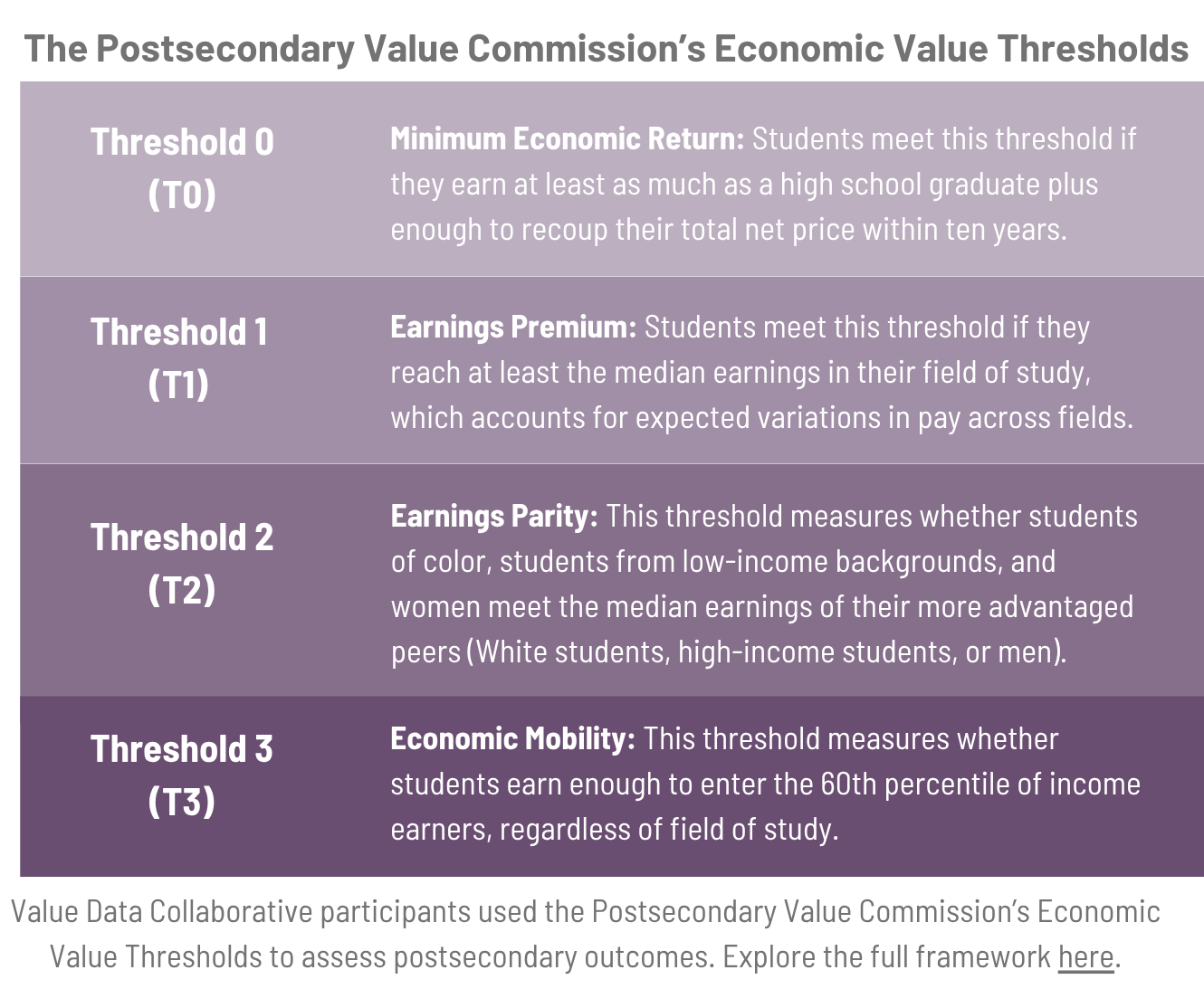IHEP’s Value Data Collaborative Offers Proof Points for Equitable Postsecondary Value
Published Jul 10, 2025
Postsecondary education should be a powerful engine for economic mobility for all students, but too often outcomes vary by race, income, geography, and other systemic factors. That’s why we launched the Value Data Collaborative to equip colleges, institutional systems, and state agencies with the tools to better understand and strengthen the value of higher education for all students.
This summer, we celebrated a key milestone: the Collaborative’s second cohort completed a customized Applied Data Analytics training, in partnership with IHEP and the Coleridge Initiative. Over the last several months, participating teams from Pennsylvania State System of Higher Education (PASSHE), City Colleges of Chicago (CCC), Kaua’i Community College (KCC), Dallas College and the state of New Jersey worked to deepen their capacity for data analysis, exchange ideas and insights, and use data to identify and address inequitable student outcomes. Participants used data on student enrollment, completion, financial aid and workforce outcomes provided by PASSHE to inform their research, with many planning to replicate their analyses using their own state, system, or institution in the future. All analyses were conducted through a secure infrastructure of the Administrative Data Research Facility and participants received tailored training to support their work.
Participants used data to make informed assessments about the economic value of postsecondary education students and develop ambitious plans to ensure their programs deliver strong, equitable economic returns. Each team explored questions of postsecondary value while remaining grounded in their students’ unique experiences, institutional and regional contexts, and the specific challenges they face. 
At PASSHE, the research team analyzed graduates’ outcomes to better understand the return they receive on their educational investment. Comparing their graduates’ lifetime earnings to those of Pennsylvanians with only a high school diploma allowed PASSHE to better understand the strong financial returns of a PASSHE degree, even after accounting for the educational investment college graduates made.
“In an environment where higher ed is increasingly scrutinized for its value, the ability to produce clear, consistent, and institutionally grounded evidence like this is critical, not only for policy and funding decisions but for building public trust in the long-term value of a PASSHE degree,” said Natalie Cartwright, PASSHE’s Chief Data Officer.
Other Collaborative teams explored disparities in outcomes across racial and ethnic groups. City Colleges of Chicago (CCC) used the PASSHE data set to practice measuring how many associate degree holders reach the 60th percentile of income or higher, a demonstration of economic mobility. Because three in four CCC students identify as Black or Latine, the team prioritized understanding outcomes for these populations in the sample set. The CCC team’s data analysis underscored the importance of including equity benchmarks as key performance indicators to ensure efforts to increase the value of a college degree benefits all students.
Another Collaborative participant, Kaua’i Community College, is a rural, geographically isolated campus that is both the only institution of higher education on the island of Kaua’i and a Native Hawaiian-serving institution. The highest degree offered at the college is an associate degree.
“Living in an island state is challenging for many students given it’s not easy to commute to another campus, let alone another island for further education,” explained Valerie Barko, Director of Institutional Effectiveness at Kaua’i Community College.
Many KCC students pursue associate’s degrees with the goal of staying close to home and securing good jobs. With this population in mind, the KCC research team investigated whether specific associate degree programs help students earn more than individuals with a high school diploma and enough to recover their investment within ten years. Armed with these data-driven findings, the team is preparing to share data and collaborate across the University of Hawai’i system to better understand and expand postsecondary value across campuses.
The state of New Jersey sought to understand how different amounts of financial aid influence student degree completion and future earnings. By examining the amounts of aid students received and tracking their outcomes, researchers gained a deeper understanding of the barriers some students might face to degree attainment, and how state policy could better support all learners.
Dallas College, a community college that also offers bachelor’s degrees, focused on what happens to students after they transfer into a four-year college. The team looked at outcomes for transfer students and a comparison group of non-transfer students with similar academic profiles, to explore bachelor’s degree completion rates, median earnings after leaving school, and the share of students earning enough to move into the 60th percentile of income earners. Armed with these insights, Dallas College plans to work with other Texas institutions within its region to create policies that support transfer students.
Our second Collaborative cohort makes clear that when postsecondary leaders collaborate and commit to using data to improve outcomes for all students, meaningful change is possible. Participants are already expanding their efforts, replicating their analyses across new campuses, and informing institutional strategy and policy improvements.
We’re proud to celebrate our Value Data Collaborative partners and eager to witness how their work continues shaping a more equitable, valuable higher education landscape for all students.


